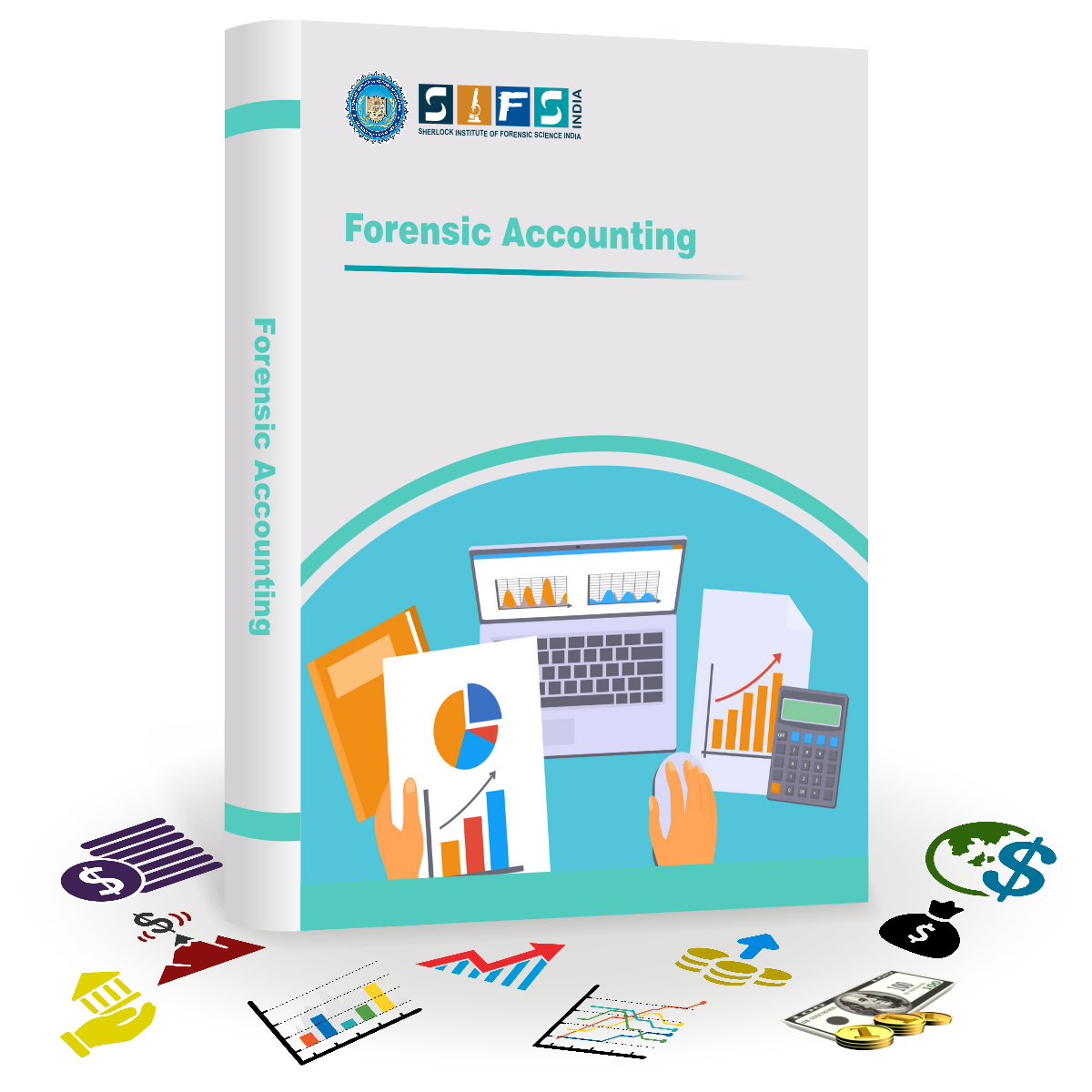MODULE 1 - FORENSIC ACCOUNTING
In this module, you will learn about forensic accounting, its historical evolution, the auditor’s mindset, the distinction between conventional accountants and forensic accountants, and the principles of forensic accounting. This module focuses on the specialized knowledge and skills required in this field and will make your foundation strong to further explore the multifaceted domain of forensic accounting.
MODULE 2 - FRAUD
This module covers the concept of fraud, its historical perspective, characteristics and root causes of fraud, types of fraud (employee embezzlement, investment scam, investment fraud, vendor and customer fraud, white collar fraud, consumer fraud), along with several other types of fraud like duplicate payment fraud, multiple payment fraud, shell fraud, defective fraud, and defective shipment fraud.
You will also learn about corporate fraud, fraud against organizations, fraud for organizations, financial fraud, diverse techniques employed by fraudsters, and the psychology underlying fraudulent activities.
MODULE 3 - FRAUD INVESTIGATION
This module focuses on investigating different types of fraud, including corporate fraud and corporate fraud detection, which focuses on critical point auditing, scrutinizing purchases and payments, auditing, and other functions. You will then learn about essential aspects of corporate fraud investigation, like identifying the opportunities for fraud, ways to uncover corporate fraud, red flags in employee and management conduct, and how to apply fraud auditing standards.
The module also covers the concept of fraud detection and investigation, which includes guidelines for investigating fraud and conducting internal corporate investigations, financial fraud and its analysis, including ratios, revenue, inventory, related financial statement fraud (liability and asset), inadequate disclosure fraud, and fraud prevention techniques.
MODULE 4 - EVIDENCE COLLECTION, ANALYSIS, AND ADMISSIBILITY
In this module, you will learn about defined evidence, the Principle of CIA (Conformity, Integrity, and Availability), various types of evidence, meticulous processes of collecting, preserving, and analyzing forensically sound evidence, and evidence handling.
The module also covers special investigation cases like investment scams, money laundering, tax fraud, resolution of fraud cases, auditing of excess bank charges, racketeering, labor racketeering, loan sharking, bank frauds, larceny, and counterfeiting currency.
MODULE 5 - DIGITAL FRAUD
This module explores the domain of digital fraud and the types and classification of digital fraud, with a special focus on e-commerce. You will gain insights about the signs of e-commerce fraud, like first-time shoppers, larger-than-average orders, big-ticket orders, orders with overnight delivery, orders from internet addresses at free email services, international shipping addresses, similar account numbers, and multiple shipping addresses.
You will then explore the fraud within e-commerce, including credit card fraud, ATM scams, online transaction fraud, bank fraud, insurance and capital market fraud, friendly fraud, clean fraud, affiliate fraud, triangulation fraud, merchant fraud, international fraud, and devices used for fraud by digital criminals.
You will learn the prevention mechanisms and the importance of constituting a robust investigating team to effectively tackle the challenges posed by digital crimes, acknowledging and overcoming potential impediments in the investigative process.
MODULE 6 - FRAUD RISK MANAGEMENT
This module explores risk management within the context of fraud prevention, multifaceted dimensions of risk, including financial reporting, misappropriation of assets, and corruption, the risk management cycle, the systematic process of identifying areas of risk, establishing dedicated risk management groups, and setting strategic goals. You will gain insights about the fraud risk management program, the crucial roles and responsibilities of financial risk managers, the identification of red flags and available resources, fraud prevention through continuous monitoring, and the effective implementation of this vigilant strategy.
MODULE 7 - FORENSIC FRAUD AUDITING TECHNIQUES
This module covers the concept of auditing and the differences between internal and external audits while exploring various auditing techniques. You will learn about various auditing methods like the "Tiger Team Test," "Application of Bedford's Theorem," "Use of Barium Test," "Data Analysis for Fraud Investigation," "Application of Inverse Logic," and "Use of Space-Time Dimension in Data Evaluation". Each method includes traditional and innovative approaches, ensuring a robust and multifaceted audit process.
MODULE 8 - FORENSIC INTERVIEWING AND INTERROGATION
In this module, you will learn the art and science of conducting effective interviews, the purposes of interviews, the essential characteristics of a good interviewer, and the planning and execution of interviews, focusing on the interviewer's demeanor, language nuances, question typology, conversational elements, and potential inhibitors of communication.
The module also covers the significance of the interview room environment, the utilization of video and audio recording while interviewing, types of witnesses (cooperative, neutral, and hostile), and creating interview strategies based on witness types.
MODULE 9 - CYBER AND IP THEFT
In this module, you will learn about the intricate details of the largest credit heist in history, an examination of how technological advancements provide a strong base for fraudsters to exploit emerging opportunities, the complexities of intellectual property theft, and a subsequent exploration of the relevant IP laws. This module equips you with knowledge and skills to handle the multifaceted challenges posed by sophisticated fraud in the contemporary world.
MODULE 10 - COMBAT FRAUDS
This module covers strategies to combat fraud within a company, focusing on the essentiality of understanding employees, including strategies such as hiring experts, establishing robust hiring procedures, creating employee awareness, implementing internal controls, and monitoring vacation balances. You will also learn about building an anti-fraud action program emphasizing the involvement of experts, training audit teams in fraud prevention, and incorporating proactive fraud audits into regular business practices.
MODULE 11 - FORENSIC ACCOUNTANTS AS AN EXPERT WITNESS
In this module, you will learn about the role played by forensic accountants as expert witnesses in court, the essential qualifications needed to become an expert witness during legal proceedings in this field, the admissibility of accounting evidence focusing on criteria to make the evidence acceptable in the legal context, knowledge about various formats of forensic reports, and approaches for the development of forensic reports.
MODULE 12 - LEGAL SYSTEM
This module covers an introduction to law enforcement, including state, federal, and foreign entities; the difference between misdemeanors and felonies, legal classification of offences, the role of the grand jury, pretrial procedures and trials, sentencing and punishment, with insights into the legal framework outlined in the Evidence Act 2011 (U.S.) and CBN guidelines, and the process of gathering evidence, which includes rules of evidence collection, hearsay exceptions, and several other rules related to evidence collection.






